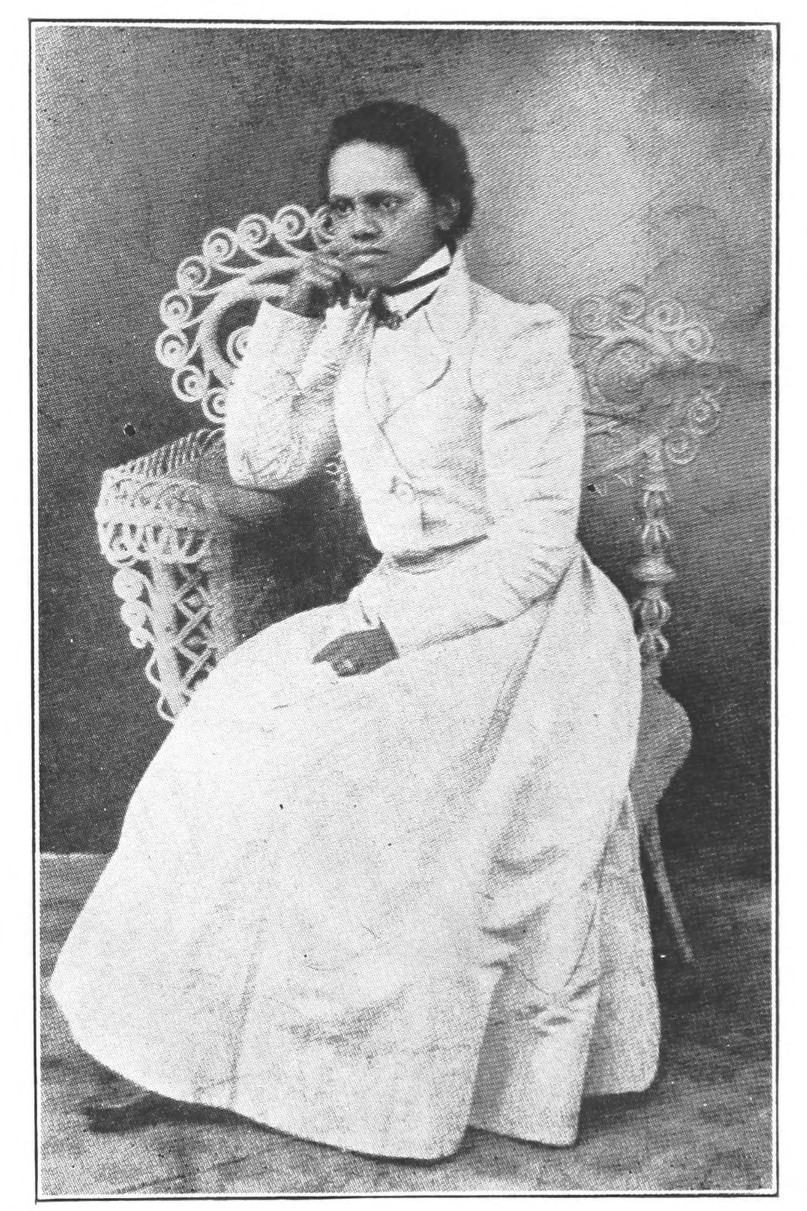
Effie Waller Smith – Noted Appalachian Poet and Educator
The Bachelor Girl
She’s no “old maid,” she’s not afraid
To let you know she’s her own “boss,”
She’s easy pleased, she’s not diseased,
She is not nervous, is not cross.
She’s no desire whatever for
Mrs. to precede her name,
The blessedness of singleness
She all her life will proudly claim.
She does not sit around and knit
On baby caps and mittens,
She does not play her time away
With puggy dogs and kittens.
And if a mouse about the house
She sees, she will not jump and scream;
Of handsome beaux and billet doux
The “bachelor girl” does never dream.
She does not puff and frizz and fluff
Her hair, nor squeeze and pad her form.
With painted face, affected grace,
The “bachelor girl” ne’er seeks to charm.
She reads history, biography,
Tales of adventure far and near,
On sea or land, but poetry and
Love stories rarely interest her.
She’s lots of wit, and uses it,
Of “horse sense,” too, she has a store;
The latest news she always knows,
She scans the daily papers o’er.
Of politics and all the tricks
And schemes that politicians use,
She knows full well and she can tell
With eloquence of them her views.
An athlete that’s hard to beat
The “bachelor girl” surely is,
When playing games she makes good aims
And always strictly minds her “biz.”
Amid the hurry and the flurry
Of this life she goes alone,
No matter where you may see her
She seldom has a chaperon.
But when you meet her on the street
At night she has a “32,”
And she can shoot you, bet your boots,
When necessity demands her to.
Her heart is kind and you will find
Her often scattering sunshine bright
Among the poor, and she is sure
To always advocate the right.
On her pater and her mater
For her support she does not lean,
She talks and writes of “Woman’s Rights”
In language forceful and clean.
She does not shirk, but does her work,
Amid the world’s fast hustling whirl,
And come what may, she’s here to stay,
The self-supporting “bachelor girl.”
–Effie Waller Smith
Effie Waller Smith (1879-1960), Noted Appalachian Poet and Educator
Despite systemic racism and sexism, poet Effie Waller Smith left a mark on the residents of Pike County and charted a legacy for modern feminist and African American poets through her writing. Her poems were noted for their environmental and feminist themes and focus on the natural beauty of the Cumberland region.
Smith was born on the banks of Chloe Creek near Pikeville to formerly enslaved couple Frank Waller and Alvindia “Sibbie” Ratliff. She was drawn to the written word and began writing at sixteen. Smith attended Kentucky Normal School for Colored Persons in Frankfort (now Kentucky State University) from 1900 to1901. There she trained to be a teacher and held teaching posts for the next 12 years.
Smith’s poetry was first published in local newspapers around 1902. She gained a following among local women including Mary Elliott Flanery, who had deep interests in politics and became the first woman elected to a Southern State Legislature in 1922 following women being granted the right to vote in 1920.
In 1904, Smith self-published her first book, Songs of the Months. It contained 110 poems, organized by months of the year. In 1909, she published Rhymes from the Cumberland, which celebrated the natural beauty of the Cumberland Mountains area.
Her tenacity and talent shone through in spite of the racism she faced. Seven of her works were published in major American literary magazines between 1908 and 1917. Her work last appeared in Harper’s magazine in 1917.
“Effie Waller Smith’s legacy goes beyond the brilliance of her poetry and how well she captures the beauty of the Appalachian landscape of Eastern Kentucky; her contributions to the educational system were foundational. In Pike County, she was a teacher first and foremost, but her writing garnered national attention at a very unexpected time. Publications like Harper’s published her poetry in the early 1900s, well before many women, especially women of color and someone born to parents who were formerly enslaved, had such a venue for their voice,” said Jay McCoy, author of the poetry book The Occupation, instructor, and multi-media artist, who serves as the archivist for the Big Sandy Heritage Center Museum.
McCoy is researching Smith for the Heritage Center in Pikeville and is hoping to spearhead a celebration of her legacy this year. He learned about Smith when she was inducted into the Kentucky Writers Hall of Fame in 2015.
“Earlier research by David Deskins (who republished Smith’s books) and Leatha Kendrick definitely has inspired and informed my current work. Also having a deep family connection to Chloe Creek in Pike County where she taught and lived, I’m driven to do what I can so more readers, in and out of Kentucky, know about her and her writing,” said McCoy.
Effie Waller Smith left Kentucky in 1918 for Wisconsin, where she lived most of the rest of her life. She raised an adopted daughter, Ruth Virginia Ratliff Smith, who was the daughter of deceased friend Polly Mullins Ratliff. Smith died on January 2, 1960, in Neenah, Wisconsin. Her legacy lives on in the work of feminist and African American poets across Kentucky.
The Tale of Two Effies
After posting we learned that there was another poet with a very similar name, Effie Smith Ely. The two (Effie Waller Smith and Effie Smith Ely) were publishing in the South in the same era. The work of one Effie was sometimes misattributed to the other Effie. We celebrate both poets and take this opportunity to draw attention to their work.
If you would like to read more about The Tale of Two Effies, please contact author and researcher Leatha Kendrick.


